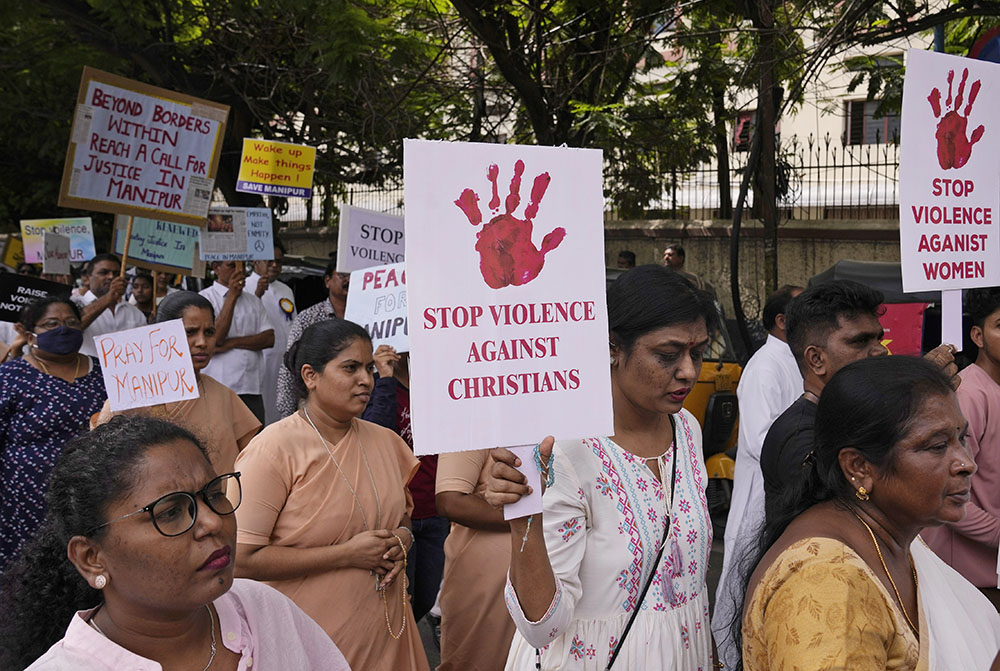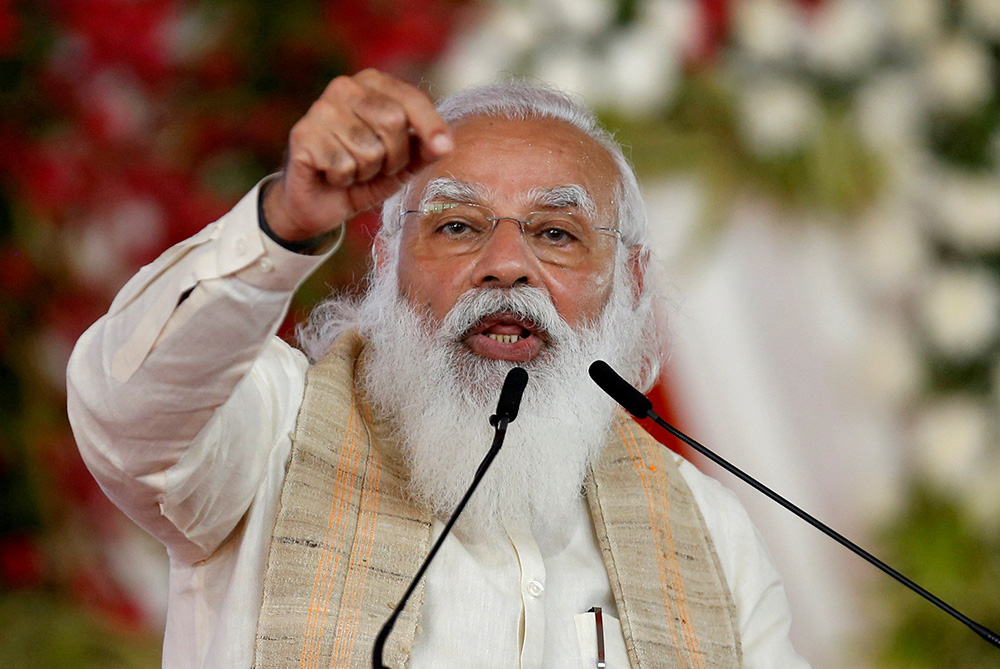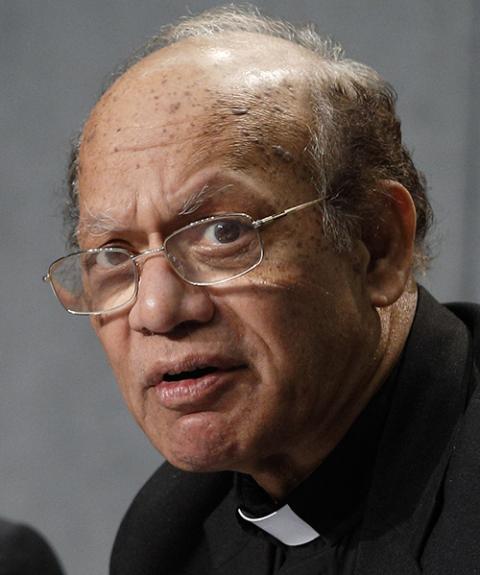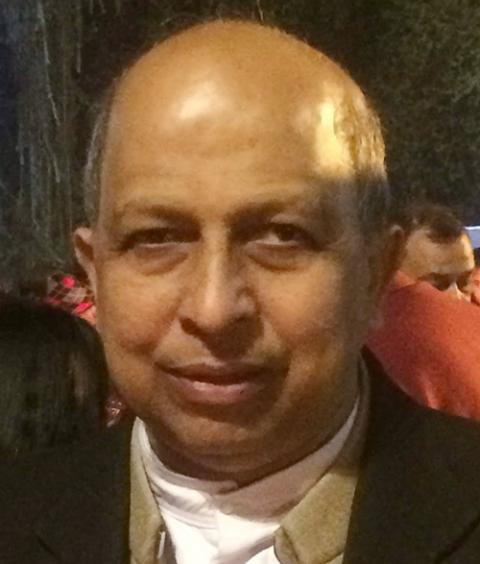
Catholic Christians hold placards and participate in a peace rally against violence in the northeastern Manipur state, in Hyderabad, India, Aug. 25, 2023. (AP/Mahesh Kumar A.)
On the auspicious occasion of Dec. 25, 2023, Prime Minister Narendra Modi hosted an unprecedented Christmas celebration at his residence in Delhi, the capital of India. This exclusive gathering included distinguished Christian leaders such as Mumbai Cardinal Oswald Gracias, Delhi Archbishop Anil Couto, and church leaders from different denominations who were treated to a melodic performance of Christmas carols by a local school choir.
Modi, in his address, lauded the Christian community for its noteworthy contributions across various fields and its historical role in the freedom movement.
Addressing the gathering, Modi said that the message of Jesus Christ's life is centered on compassion and service and that Christ worked for an inclusive society where justice was for all. Modi highlighted these values as a "guiding light" in his government's development journey.
Gracias even opted to skip his Christmas Day Mass in Mumbai to attend the prime minister's lunch in Delhi, a move that raised eyebrows. The cardinal, in his message, thanked the prime minister profusely: "Sir, thank you for all that you are doing for the country, thank you for all that you are doing for the Christian community, and thank you for what you are doing all over the world."
Other Christian leaders who attended the event, including Catholics, Protestants, and Orthodox leaders, praised Modi. No one had anything to say against the ongoing attacks on Christians, pastors, priests, nuns and institutions.
Couto — who was previously enmeshed in controversy for asking Christians to fast every Friday for the nation, which was in a "turbulent political atmosphere" that was posing a threat to India's "democratic and secular fabric" — thanked Modi for celebrating Christmas in his residence. The archbishop, emphasizing the values of peace, love and unity, expressed a heartfelt desire for the welfare of all the country's citizens and the realization of the prime minister's vision of "Sabka Saath Sabka Vikas" ("Development for all, with everyone, by everyone").
The archbishop concluded his speech by saying, "We thank you for your wonderful leadership for the nation and at the global level."
The event has sparked considerable controversy, with more than 3,200 Christians across the country expressing their disapproval through a signature campaign. They have endorsed a statement titled "Not In Our Name," directed at Christian representatives during the celebration.
The statement says these representatives, who profusely thanked the prime minister for various reasons, have overlooked the harsh reality that he and his government have consistently neglected their constitutional responsibility to Christians, minorities, the poor and the backward castes.
Numerous people claim that in the secular landscape of India, it is unusual for the prime minister to host a Christmas celebration, particularly one attended by prominent Christian leaders.
This choice has sparked some skepticism, as Christmas is traditionally celebrated within Christian parishes, dioceses and communities. The clergy and church officials are expected to join the people in the Christmas festivities. So they could have politely declined the invitation.
Most significantly, the dissent is fueled by the escalating challenges encountered by Christians in India since 2014, coinciding with the tenure of the Modi government. These challenges include the destruction of churches, attacks on pastors and the faithful, and denial of their rightful privileges under Article 25.
Instances of attacks and persecution against the church in India have reached unprecedented levels. According to a report from the United Christian Forum, the Christian community encountered more than 400 hate crimes in the initial half of 2023, averaging more than two incidents per day. In June alone, there were roughly three incidents reported daily.
The forum expresses dismay that an appeal directed to Modi, President Droupadi Murmu and Union Home Minister Amit Shah has unexpectedly received no response thus far.

Indian Prime Minister Narendra Modi is pictured in a March 12, 2021, photo. (CNS/Reuters/Amit Dave)
The anti-conversion laws implemented by the current regime exacerbate the marginalization and diminishing status of Christians. This religious group, along with Muslims, has been subjected to targeted hatred, mob lynching, and segregation due to policies directly affecting minority communities.
Smaller denominations involved in social and educational initiatives have also encountered obstacles, including issues related to monetization and the cancellation of the Foreign Contribution Regulation Act.
Currently, India not only witnesses challenges faced by minorities, but it also ranks lowest on many indices. According to the Wire, India is ranked 111 among 125 countries in the Global Hunger Index report released by two European agencies on Oct. 12, 2023.
For the past eight months, Manipur, a northeastern state of India, has transformed into a war zone marked by persistent violence that has drawn global attention. Daily incidents include the burning of homes, people being pursued, women being assaulted, and youth fleeing to alternative locations.
Primarily, the victims of the ethnic violence in Manipur are Christians from tribal communities. The conspicuous silence of the prime minister regarding the ongoing conflict is certainly unsettling.
Therefore, the Christmas celebration hosted by Modi has sparked significant outrage, prompting Christians across the nation to question the sincerity and inclusivity of the prime minister himself and the event. The dissatisfaction expressed by a substantial number of Christians reflects the ongoing challenges faced by the community, ranging from attacks and persecution to the suppression of religious freedoms.
Advertisement
Additionally, the perceived silence of church leaders during the Christmas event has left many Christians feeling unheard and unsupported. This apparent silence from high-ranking church officials has intensified dissatisfaction within the Christian community. Many faithful believe that these leaders failed to fulfill their moral responsibility by not speaking up for the oppressed and marginalized, which goes against the true spirit of Christmas.
The event highlights the need for open dialogue and prophetic courage from church leaders to address the concerns of the flock entrusted to them and to uphold the true spirit of Christmas.
The controversy surrounding Modi's Christmas celebration prompts reflection on the true essence of Christmas. Jesus Christ, born into poverty during turbulent times, symbolizes love, joy, truth, justice, fraternity and equality. His teachings emphasized standing against exploitation, authoritarianism and unjust government systems.
This invites contemplation on whether the values associated with Christmas are being authentically upheld in the current sociopolitical context.
The profound significance of the Incarnation is found in its solidarity with the marginalized, the outcast, the lost and the least. Emerging from a backdrop of pain, destruction, darkness and death, the infant Jesus defied empires, spoke truth to power, and secured an enduring triumph over death and darkness.
It is this very child who achieves such a feat and invites his followers to go after him. The Christmas story, at its core, represents a powerful message of hope, resilience, and a call to stand against oppression and injustice.
May the virtues of Christmas guide us in the new year, inspiring us to be in solidarity with the marginalized, the poor, Dalits, tribals and minorities — the last and the least — in our endeavor to build his kingdom.









